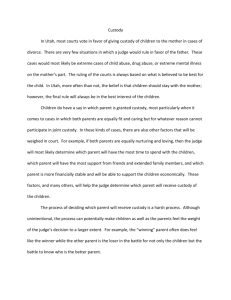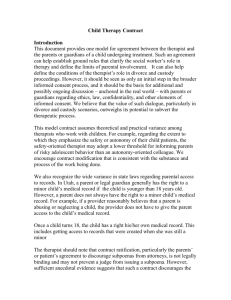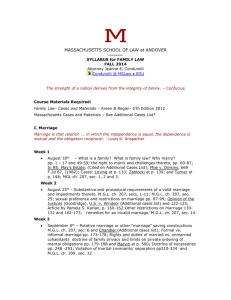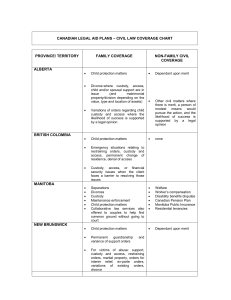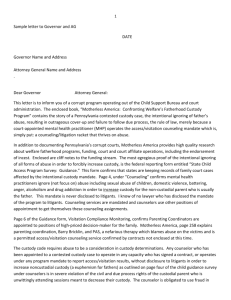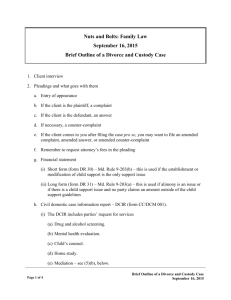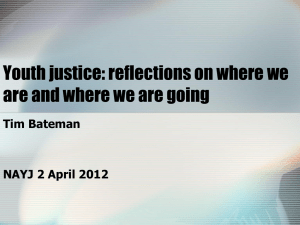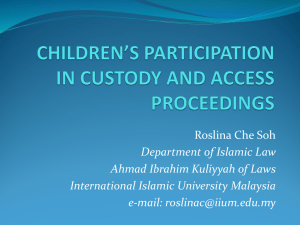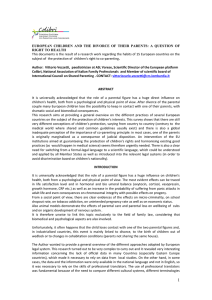Criminal Psychology - Kellogg Community College
advertisement
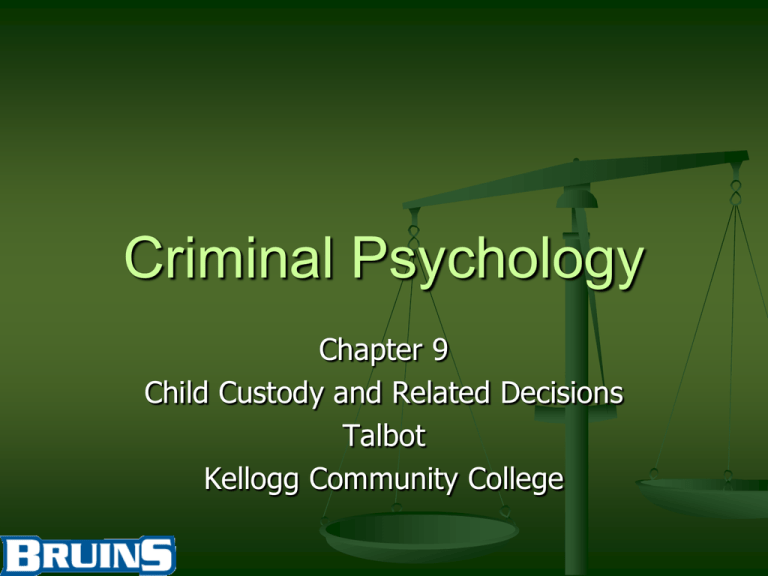
Criminal Psychology Chapter 9 Child Custody and Related Decisions Talbot Kellogg Community College Child Custody – “A thankless job”. Why? “It is my least favorite area.” Dr. Lenore Walker Children Embryos High profile, high emotion cases. O.J. Simpson, 1996 Elian Gonzales The Roles of a Psychologist Marriage Counselor Mediator Child Therapist Court Appointed Evaluator Expert Witness Applied Researcher Marriage Counselor Definition: Marriage counseling is a type of psychotherapy for a married couple or established partners that tries to resolve problems in the relationship. Typically, two people attend counseling sessions together to discuss specific issues. Goals: Identify issues related to marital problems. Improve communication and empathy skills. Decrease stressors affecting marital relationships. Encourage a successful marriage type. Marriages Successful Types Unsuccessful Types Validating Volatile Avoidant Hostile Engaged Hostile Detached Biggest Difference? Marriage Counselor Definition: Marriage counseling is a type of psychotherapy for a married couple or established partners that tries to resolve problems in the relationship. Typically, two people attend counseling sessions together to discuss specific issues. Goals: Concerns: Identify issues related to marital problems. Improve communication. Decrease stressors. Encourage a successful marriage. 2 Types of Individuals seeking services. Outcome expectations. Testimony in court. Dual Relationships: Mediator Mediation: An alternative to litigation Definition: Mediation is facilitated negotiation, whose object is the consensual resolution of a dispute on terms that the parties themselves agree upon. It is a form of alternative dispute resolution in which a neutral party (a mediator) selected by the parties seeks to determine the interests of the parties, discover which of these interests may be shared, and alert them to a resolution that may further those interests. Benefits of Mediation: Less formal and less adversarial. Private and confidential. Typically express greater satisfaction with the outcomes. Cases get settled more quickly. Goal: Assist in attaining resolution between parties by addressing differences, offering possible solutions and developing an agreement. Problems? Advocate? Allow for victimization? Child Therapist Divorce as a traumatic event. Expectations following a divorce: Change in parenting styles. Behavioral issues. School difficulties. Relationship issues between the child and parents. Increased chance of adult divorce. Sleeper Effect (2/3rds of women 19 – 23) Problems? Court Appointed Evaluator 2 prong responsibility: Evaluate Recommend Rarely utilized for this purpose: Why? Often determined in the period of mediation or bargaining. It is a decision based upon responsibility and moral guidance. Psychologists often misrepresent themselves and their abilities in these areas. Evaluation The psychologist must approach this task, “unburdened by any particular point of view or preset conclusions.” What can interfere with this charge? Characteristics: Identification of issues and problems. Credible and well-reasoned (supported conclusions). Fair and unbiased. A psychological report which avoids psychological jargon. Contain clear recommendations for the court based upon the data. Recommendations Legal custody – the right to make legal decisions for the child. Physical custody – where the child resides on a day-to-day basis. Sole custody v. Joint or Shared custody. Divided custody Expert Witness Stepping into the Lion’s Den. Problems of being hired by one side or the other. Problems with being court appointed evaluator. The nature of the issues (i.e. custody) being evaluated. Prized possessions (18th century) Mother’s rights – Tender-years doctrine (Early 19th century) Best Interest of the Child (1970’s to present) Custody Consideration The mental and physical health of all individuals. The child’s adjustment. The parent’s ability to provide food, clothing, medication, etc… Parental lifestyle and subsequent ability to interact and interrelate. The wishes of the parents and children. Steps in the evaluative process Other areas of contention or debate 1. 2. 3. 4. 5. 6. 7. Custody for a mixed race couple. Custody for children of parents with physical or mental health problems. Custody issues involving parents who have alternate sexual orientations. Custody issues concerning conflicts between the requests of the child and the recommendations of professionals. The presence of criminal records. The consideration of cultural and religious beliefs. The use of psychological tests and measures (MMPI – 2) 1. 2. 3. 4. Parenting satisfaction scale Parenting stress index Parent child relationship index WAIS Ethical Issues and Temptations Recognizing limits and biases Avoiding dual relationships Informed consent Confidentiality Custody Evaluation v. Psychological Evaluation C.E. – assist the trier of fact in the determination of what is in the best interest of the child. P.E. – identify and determine the presence of any diagnosable condition, or symptoms of mental illness or defect. Applied Researcher 1. 2. Address or answer questions posed by the triers of fact which concern issues of psychology and human behavior. Comment on available research as it pertains to the court’s questions without application to the current case. What do the clients want? The children The family fixed. What do they get? The parents To win. What do they get? Objective evaluation of their best interest. A fair and unbiased evaluation. The judge An understanding of the situation or specific psychological considerations and principles. They may ask too much or even encourage dual relationships
